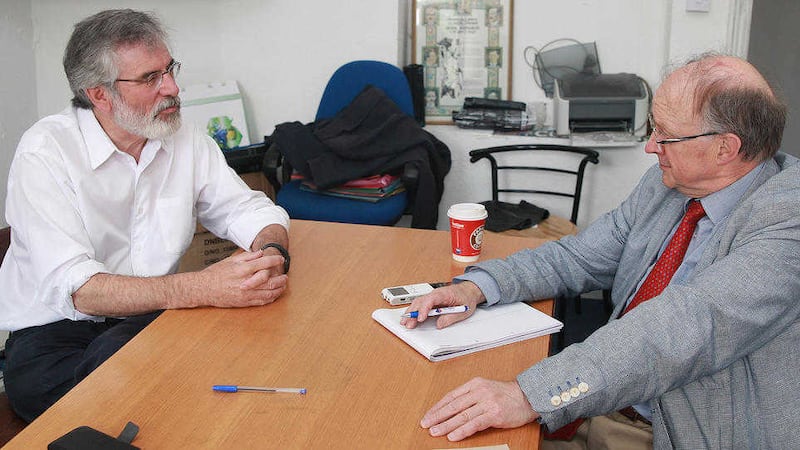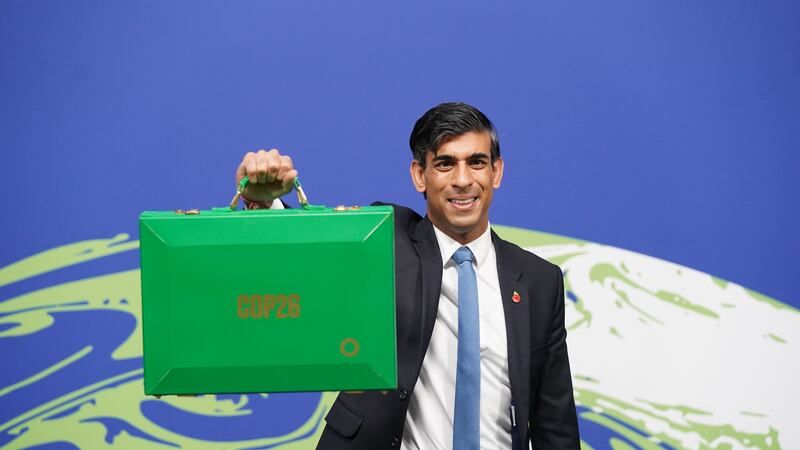SINN Féin will continue to promote the concept of an all-Ireland forum to deal with the fall-out from the Brexit vote, Gerry Adams has said.
The party president also said he still thinks it was a good idea to demand a border poll in the aftermath of the EU referendum.
"There obviously is a challenge trying to get a majority in the north to support us but it's a very legitimate demand and we will continue to pursue it."
He shares the view that the referendum wasn't just about finances and economics, it was also about people's identity.
"I'm not suggesting for a second that those who voted to remain from a unionist perspective have become united Irelanders, they patently haven't. But they're on a little voyage in the next two years, as these negotiations go on," he said.
In that context, he believes the Taoiseach could play an important role but claims Enda Kenny "fumbled the ball" on proposals for an all-Ireland forum, which have been rejected by the DUP.
Given that the Dublin government was raising expectations in advance of a North-South Ministerial Council meeting this week, he was surprised there was no effort beforehand to get Arlene Foster's party on side.
When the meeting took place at Dublin Castle, the Taoiseach did not raise the forum issue at all.
Mr Adams comments in sporting terms: "He's not good on the breaking ball, he's just not."
But the Sinn Féin leader believes the forum idea should still be pursued.
"The DUP might decide not to attend and that would be disappointing and regrettable but civic unionism would attend, [also] the voluntary sector, the community sector and people involved in agriculture and business. A whole range of civic society would attend."
Mr Adams said he has also been observing the post-Brexit leadership crisis in the British Labour Party.
"I know Jeremy a very, very long time," he said.
"It's classical stupidity, at a time when the Tories are in complete disarray and the working people would be looking for a positive, progressive voice, that the Labour parliamentary party would mount a leadership hit against a guy who was just in the job for nine months. It's ridiculous."
Whereas he wants Mr Corbyn to remain as Labour leader, on the Tory side he is certainly not keen on Michael Gove, who previously criticised the Good Friday Agreement and argued the IRA could have been defeated militarily.
"I read his little paper, somebody drew it to my attention and it's just rank right-wing nonsense," he said.
Turning to other issues, the Sinn Féin leader renewed his call for a truth recovery process for the Troubles and said republicans should be every bit as open about their activities as those on the other side of the conflict.
"I can't, in all conscience, rail against British or unionist paramilitary involvement in attacks and not hold republicans to the same standards. What happened at Kingsmill was absolutely and totally wrong. What happened in Birmingham was totally wrong."
Asked if he believed republicans and loyalists should come forward in such a process and describe their actions, he replied: "I do. And the people who are resisting that at the moment are the British government. And I don't for a second minimise the challenge that will be for republicans."
Commenting on the use of weapons imported from South Africa in loyalist atrocities at Loughinisland and elsewhere, he said he still possessed a fragment of a grenade from that country which was used in an attack on his own house in Belfast in June 1993.
He said the weapons were "brought in with the active support and direction of MI5".
Asked about the 'Stakeknife' investigation into security force infiltration of the IRA, he said: "I have never bought into the use of the term 'Stakeknife' and all of that. But what I do know for a fact is that the British did have agents and they ran the loyalist operations.
"Now loyalists may have had their own agendas and so on but the UDA and the UVF were actually founded or regenerated by the British.
"The British clearly had agents in the IRA, that's a matter of fact. I have met with many victims of the conflict, including victims of the IRA. That also is hugely traumatising for the families of those who were killed by the IRA.
"I don't know about the detail of all or any of this but, just in general terms, if you ask me: did the British have agents in the IRA? Yes, they did. Clearly so."
And asked if it bothered him that many people don't believe he was never in the IRA, the Sinn Féin leader replied: "No, it doesn't at all."
Among the headline stories of the recent assembly election was the success of People Before Profit, with Gerry Carroll topping the poll in the republican heartland of West Belfast.
Veteran campaigner Eamonn McCann also won a seat in Foyle.
Does Mr Adams think their success reflected any disillusionment with Sinn Féin at grassroots level?
Confining his reply to west Belfast, "because I know it best", he claimed People Before Profit had "exploited" local issues such as the Casement Park controversy, accusing them of opportunism.
"They did get young people to vote for them and I think it's a warning, if that's the right term to use, to the party that we can't be complacent, that we have to be on our game."
In the general election in the south, Sinn Féin went from 14 up to 23 Dáil seats, but there was a good deal of comment suggesting the party could have done better.
Mr Adams rejects this - and claims he can prove it.
"My view always was we would win between 23 and 25.
"We got a big bank loan to bankroll the election and we did it on the basis that we would get 14 per cent of the vote. That was six months before the election."
Sinn Féin got 13.8 per cent of first preference votes in the election in February.
Parties in the south receive funds in accordance with their share of the votes - in 2015, for example, Sinn Féin was paid €720,000 based on a 9.9 per cent result in the 2011 general election.
Mr Adams didn't provide the name of the bank or the amount of the loan but he said: "They gave us it on the basis of we were saying to them 'We're going to win 14 per cent of the vote which will mean we'll get some state funding and all of that'."
He added: "The point I was making was, that's proof that our take on it was 14 per cent."
Noting that a new generation of Sinn Féin TDs and Senators had arrived at Leinster House, Mr Adams was asked: "How long are you going to stick around?"
He replied that "there's also a whole new cadre in the north: look at our ministers", adding: "So, that's the point, that we're actually in a process of transition and part of my job is to, if you like, manage and oversee that. And it's not complete. And I have no plans to retire."
Asked if he was saying this because he wanted to discourage the endless speculation about his political future, Mr Adams said: "It's because I've no plans to retire."







